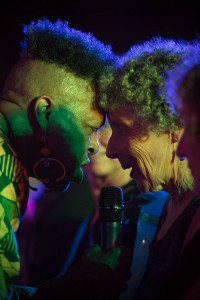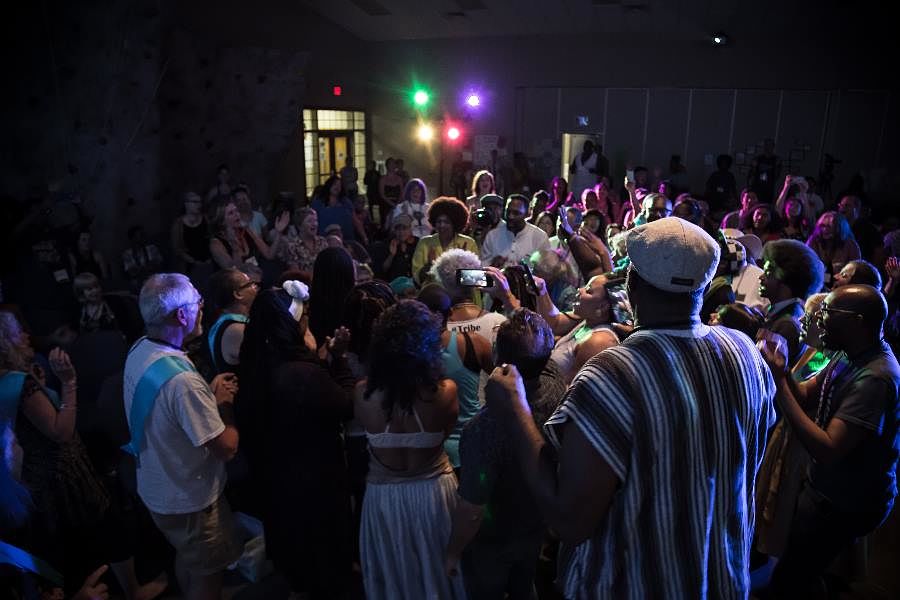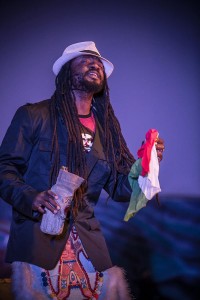ARDEN, N.C.: The names kept coming, and their mention generated not just noisy applause but palpable waves of affection from the assembled crowd: Activist, writer, and performer John O’Neal! Playwright, poet, and essayist Jo Carson! Theatremaker, organizer, and teacher Bob Leonard! Director, playwright, and theorist Linda Parris-Bailey! Organizer, writer, and local politician Kathie deNobriga!
All told, nearly two dozen honorees at Alternate ROOTS’s 40th anniversary reunion meeting, part of the group’s annual meeting and artists’ retreat Aug. 10-14—those who had “been in it for the long haul,” as the event’s spiffy program book described them—were cheered, toasted, caricatured in scripted sketches, and roundly celebrated by their theatrical colleagues.
This select roster of veteran art makers had been actively involved in ROOTS—the Regional Organization of Theatres South—for 30 years or more, and that considerable time span meant that not all of them were still on hand to soak up the praise. Carson, for example, who died in 2011, was memorialized at the gathering by a scene from her award-winning seriocomic play Daytrips, about the impact of Alzheimer’s on a Tennessee family. O’Neal, the revered New Orleans-based founder of the Free Southern Theatre and Junebug Productions, was present (as were stacks of his new collection Don’t Start Me to Talking…, freshly published by TCG Books), but his usual role as performer was assumed by 40-year-old William “Webo” O’Neal, who offered a rousing (if sorely abbreviated) interpretation of his father’s Junebug Jabbo Jones monologues.
Who are these ROOTS folks, and what have they been up to for 40 years? From its founding—following a 1976 convocation at the Highlander Research and Education Center, a bastion of labor and civil rights activism near Knoxville, Tenn.—ROOTS has championed localism, the once unlikely idea that artists shouldn’t have to leave the communities in which they live to practice their art, and that people in those communities should be empowered through art to tell their own stories and shape their own destinies. Originally conceived as an amalgam of arts organizations, mainly performance ensembles from across the American South, ROOTS in short order embraced individual members as well, geography notwithstanding. Diversity, equality, and battling racism and oppression were priorities from the beginning, and that focus has solidified in the years since into a virtual mantra for arts-based social change. (See Dudley Cocke for more here.)
“For 40 years we have been investigating how to make participatory democracy work,” says Leonard, who teaches directing and performance at Virginia Tech, of ROOTS’s purposeful amalgam of arts and activism. “We are our own laboratory.”

What happens in a laboratory is by definition unpredictable, and this four-day retreat at the lushly forested 160-acre Lutheridge Camp and Conference Center just south of Asheville, N.C., had its characteristically volatile as well as celebratory moments. In a showcase evening anchored by Florida-based performer/director Andrea Assaf’s hard-hitting multimedia production Eleven Reflections on September, a post-9/11 meditation on the Arab-American experience in the U.S. and abroad, another troupe, the Pacha Mamas, broached environmental justice issues through a Native American lens in a piece called Guardians of Gaia, though only one of the three performers appearing in the show’s healing ritual for Mother Earth was of Native heritage. That led to a post-show wrangle over one of ROOTS’s most cherished ideals: Don’t make art that appropriates the experience, the culture, or the struggles of others.
“We have to rethink things and determine where our intent coincides with what people are hearing and seeing,” offered Parris-Bailey, who moderated a discussion that stretched deep into the night. In response to Native American attendees who felt affronted by the work, she noted diplomatically, “Intention is not the same as impact.”
Other sessions, like a late-night live-music cabaret labeled Café Bizzoso and an a cappella “ROOTS Playlist” singalong, were strictly joyous. The latter convening explored the canon of songs, chants, and musical riffs (sometimes in multiple languages) associated with the organization over the years—standards like “Down by the Riverside” and “This Little Light of Mine” (which morphed into a jubilant anthem during a later session paying affectionate tribute to Little Rock, Ark.-based cultural organizer Tufara Waller Muhammad).

ROOTS executive director Carlton Turner, who arrived late at the confab due to the birth of his third child, joined Syracuse University drama professor and community-based theatre specialist Jan Cohen-Cruz to supervise “It’d Take Some Tellin’,” a session designed to shape plans for a publication that will explore ROOTS’s history through a “multi-perspective, multigenerational, issue-oriented lens.” Early-era ROOTsers like Eleanor Brownfield, Priscilla Smith, and Sandra Hughes, all hailing from Atlanta; Elise Witt of Pine Lake, Ga.; and Appalachia-based Camille Shafer were part of a large story-circle team attempting to locate what Cohen-Cruz called the “energy and heat” in the ROOTS narrative.
For freelance strategist Ashley Sparks, who was enlisted to produce the reunion programming, those “elders”—the ones present back in the Highlander days—were key elements in that narrative. In tandem with colleague Nicole Garneau, Sparks set out “to find all those people who were around in 1976—we spent the last six months searching through archives, making calls, stalking them on the Internet,” she said. “Half of those original theatre companies don’t exist anymore, but we found representatives of every single theatre ever associated with ROOTS, though not all of them were able to show up on that Friday in North Carolina.” Among other pieces on the program, Sparks commissioned widely traveled playwright Will MacAdams to script a short play incorporating the personalities and memorable productions that ROOTS had spawned, providing him some 40 hours of interviews and transcripts as fodder. It played like gangbusters.

ROOTS’s rural orientation aside, the organization brings the digital age into full play: Multiple film cameras recorded goings-on throughout the convening, and participants could be spotted talking in hushed tones into their iPhones and recorders; summaries and information bulletins flowed daily, even hourly. Any ROOTS member can join executive committee confabs, pointed out newly elected board president Trey Hartt, a 30-year-old juvenile-justice advocate from Richmond, Va., by call-in or video chat.
“We’re breaking the model of small groups making decisions that impact large numbers of people,” Hartt contends. “ROOTS operates instead on a consensus model that allows for greater ownership of the work that needs to be done across the South.”
Hartt was part of a 10-candidate board slate that appeared before the assembly for a friendly grilling during the business portion of the meeting (all were confirmed with virtual unanimity). “If you could have 40 of something, what would it be?” was the most fanciful of the queries, and answers ranged from the grandiose (“40 million dollars” and “40 lifetimes”) to the whimsical (“40 flavors of ice cream” and “40 dance partners”).
Part of ROOTS’s mission is funding its constituency, and a cash-collecting effort led by operations director Keryl McCord (with a 2016 goal of matching 40 years of longevity with $40,000 in new funds) proved not only productive but surprisingly funny. McCord’s pitch for donations was interrupted by a storm of honorifics from her closest colleagues—one dubbed her “chief money-dancer and shakedown queen.” McCord, a veteran arts management professional who has lived in Georgia since 2006, has been instrumental in boosting ROOTS’s current budget into the neighborhood of $1.3 million.
Most of that money, noted another session leader and ROOTS honoree, New Orleans-based MK Wegmann, comes from national foundations, not just those focused on the Southern U.S., and it is dispensed in turn to organizations and artists for the purposes of “art-making, professional development, and infrastructure support.” But, according to Wegmann, recently retired from her post as head of the National Performance Network/Visual Arts Network, the essential character of the ROOTS organization transcends economics, residing instead in the realm of personal values. There’s a reason for the frequent and far-flung get-togethers that ROOTS has made its calling card.
“Face-to-face gatherings like these are essential to keeping the ROOTS experience alive,” Wegmann maintains. “One of the things about organizing is that trust is essential. You can have ongoing conversations via media, but you will never truly trust people until you see them face to face. That’s the best way to organize people in common cause.”
Jim O’Quinn, the founding editor of American Theatre magazine, now lives in New Orleans. He first wrote about Alternate ROOTS in 1982. Roadside Theatre’s Dudley Cocke has more here on the organization, its mission, and its work.


